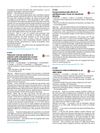
Search
for
Sort by
Research
270-300 / 1000+ results

research Prolonged Treatment with Finasteride (a 5α-Reductase Inhibitor) Does Not Affect Bone Density and Metabolism
Long-term finasteride use doesn't change bone density or metabolism.

research The Rationale for Inhibiting 5α-Reductase Isoenzymes in the Prevention and Treatment of Prostate Cancer
Inhibiting 5α-reductase can help reduce prostate cancer risk and improve treatment.

research Characteristics of Men Who Report Persistent Sexual Symptoms After Finasteride Use for Hair Loss
Finasteride for hair loss may cause persistent sexual symptoms, depression, anxiety, and lower quality of life.

research Frontal Fibrosing Alopecia Among Men: A Clinicopathologic Study of 7 Cases
Men with Frontal fibrosing alopecia typically lose hair on the front scalp and sometimes on sideburns and upper lip, with treatments showing varied success.

research Finasteride-Induced Inhibition of 5α-Reductase Type 2 Could Lead to Kidney Damage: An Experimental Animal Study
Finasteride may cause kidney damage.

research Polycystic Ovarian Syndrome: A Pain for Young Women? An Autobiographical Case Study
Early diagnosis and treatment of PCOS can prevent complications and improve symptoms.

research Do Men's Faces Really Signal Heritable Immunocompetence?
Masculine facial features may not reliably indicate heritable health, and more research is needed.

research Hair Loss in Women: Comprehensive Overview and Treatment Options
Effective hair loss treatment in women requires correct diagnosis and can include medications like minoxidil, antiandrogens, and treatments for underlying conditions like PCOS.

research Polycystic Ovary Syndrome: Management of a Long-Term Condition in Primary Care
Manage PCOS in primary care with weight loss, psychological support, medication, and monitoring for health risks.

research The Long-Term Effect of Specific Type II 5α-Reductase Inhibition With Finasteride on Bone Mineral Density in Men: Results of a 4-Year Placebo-Controlled Trial
Finasteride doesn't harm bone density in older men with BPH.

research The Biology of Hair Growth
Hair growth is influenced by hormones and goes through different phases; androgens can both promote and inhibit hair growth depending on the body area.

research COVID-19, Androgens, and Androgenic Alopecia
COVID-19 may worsen with androgens; anti-androgen drugs could help.

research An Unusual Cause of Primary Amenorrhea
The 18-year-old girl likely has a condition called müllerian agenesis, which caused her to not have a uterus and experience no menstrual periods.
research Impact of Estrogens in Males and Androgens in Females
Both estrogens and androgens are important for health in both males and females.
research Spontaneous Lesions of Endangered Geriatric Julia Creek Dunnarts (Sminthopsis Douglasi, Archer 1979) with Emphasis on Reproductive Pathology
Geriatric Julia Creek dunnarts often suffer from reproductive and skin diseases, impacting conservation efforts.
research Peripheral Neuroprotective and Immunomodulatory Effects of 5α-Reductase Inhibitors in Parkinson's Disease Models
Dutasteride may help protect neurons and reduce inflammation in Parkinson's disease.
research Serum Levels of Testosterone and Dehydroepiandrosterone Sulfate in Females with Acne and/or Female Pattern Hair Loss
No strong link between testosterone or DHEAS levels and acne or hair loss in females.

research The Therapeutic Use of Androgens in Women
Testosterone replacement may improve sexual desire and bone health in women with low androgen levels, but more research is needed on its long-term safety.

research International Society for the Study of Women's Sexual Health Clinical Practice Guideline for the Use of Systemic Testosterone for Hypoactive Sexual Desire Disorder in Women
Testosterone can help premenopausal and postmenopausal women with low sexual desire, but its long-term safety is unclear and it's not widely approved for this use.

research Practical Geriatrics: Maintaining Sexual Health After Menopause
Maintaining sexual health after menopause is possible with patient approaches, hormone supplements, and therapy, despite needing more research.

research Polycystic Ovarian Syndrome in Patients with Schizophrenia Treated with Atypical Antipsychotics: A Case Control Study
Women with schizophrenia on atypical antipsychotics are more likely to have polycystic ovarian syndrome (PCOS) than women without schizophrenia.

research Increased DHEAS and Decreased Total Testosterone Serum Levels in a Subset of Men with Early-Onset Androgenetic Alopecia: Does a Male PCOS-Equivalent Exist?
Some men with early hair loss may have a male version of PCOS, affecting hormones and increasing health risks.

research Testosterone Improves Antidepressant-Emergent Loss of Libido in Women: Findings from a Randomized, Double-Blind, Placebo-Controlled Trial
Testosterone may help increase sexual events for women with low libido due to antidepressants.

research Common Variants in the Sex Hormone-Binding Globulin Gene Influence SHBG Levels in Women with Polycystic Ovary Syndrome
Certain SHBG gene variants, like rs727428, are linked to higher testosterone levels in women with PCOS.

research Improvement in Scalp Hair Growth in Androgen-Deficient Women Treated with Testosterone: A Questionnaire Study
Testosterone therapy helped 63% of androgen-deficient women grow scalp hair, but more research is needed.

research 5α-Metabolism in Finasteride-Treated Subjects and Male Pseudohermaphrodites with Inherited 5α-Reductase Deficiency
Finasteride lowers DHT levels and raises testosterone in a dose-dependent way.

research Androgen Therapy in Women: A Reappraisal: An Endocrine Society Clinical Practice Guideline
The guidelines advise against using testosterone and DHEA in women for most conditions due to safety and effectiveness concerns, but suggest considering testosterone for postmenopausal women with low sexual desire.

research Testosterone Implants in Women: Pharmacological Dosing for a Physiologic Effect
Testosterone implants in women require pharmacological dosing to be effective and are generally safe and well-tolerated.
research The Current and Emerging Role of Statins in the Treatment of Polycystic Ovary Syndrome: The Evidence to Date
Statins may help treat PCOS by lowering androgen levels and improving cholesterol.